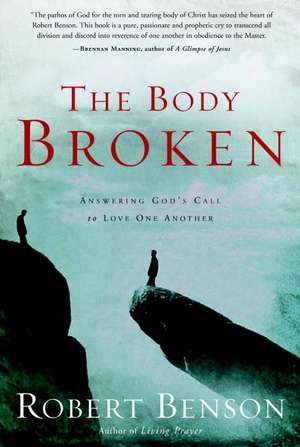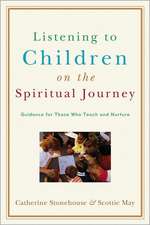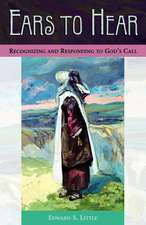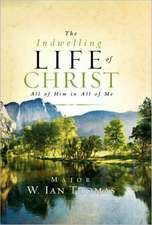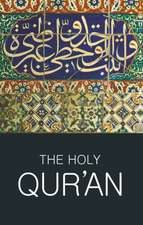The Body Broken
Autor Robert Bensonen Limba Engleză Paperback – 17 aug 2004
“The pathos of God for the torn and tearing body of Christ has seized the heart of Robert Benson. This book is a pure, passionate and prophetic cry to transcend all division and discord into reverence one another in obedience to the Master. One more thing: Benson is a helluva writer!”
-Brennan Manning, author of A Glimpse of Jesus
“In a time when bookstores are full of books and films about the end of the road (everyone seems to want to know), The Body Broken takes us on a journey for the sake of the journey itself, and in the process, it teaches us about loving one another, not by imperative, but by example.”
—from the foreword by John Fischer, author of Love Him in the Morning: Reflections on God’s Faithfulness
Jesus prayed for our unity as believers in the hours before His betrayal and crucifixion. Robert Benson tenderly pleads for all of us who follow Him to heed our Lord’s petition and concentrate on what unites us instead of what divides us. In a thoughtful and beautifully written volume Benson challenges each of us to reexamine what it means to be a follower of Jesus in the diverse body of Christ. His honesty and heart for the church shine throughout this book. I thoroughly enjoyed it.
-Dave Burchett, Author of Bring’em Back Alive: A Healing Plan for those Wounded by the Church and When Bad Christians Happen to Good People
“Again and again, Robert Benson speaks to my heart. His search for authenticity and the power of his words to articulate the way stations on that pilgrim pathway resonate for me in a unique way. The Body Broken lifts us into a new dimension of spiritual reality.”
— Luci Shaw, Writer-in-Residence, Regent College and author of Water Lines
“As always, Benson’s deceptively simple storytelling sneaks up on you. His style, a fusion of gentleness, raw truth, and quiet power (remind you of anyone?), is put to good use here. The Body Broken is a keeper.” — Nikki Grimes, award-winning author of Bronx Masquerade and What Is Goodbye?
“It is a great irony that all of us who love Jesus and know that he prays for us, even now, that we “may all be one,” have such a difficult time loving one another. Robert Benson doesn’t exactly tell us how to do it but he does tell an honest story about the ways that Jesus’ prayer is getting worked out in his life.”
— Eugene Peterson, Professor Emeritus of Spiritual Theology, Regent College, Vancouver, B.C.
Preț: 64.14 lei
Nou
Puncte Express: 96
Preț estimativ în valută:
12.27€ • 12.85$ • 10.16£
12.27€ • 12.85$ • 10.16£
Carte disponibilă
Livrare economică 17-31 martie
Preluare comenzi: 021 569.72.76
Specificații
ISBN-13: 9781400070763
ISBN-10: 1400070767
Pagini: 178
Dimensiuni: 140 x 210 x 10 mm
Greutate: 0.23 kg
Editura: Prh Christian Publishing
ISBN-10: 1400070767
Pagini: 178
Dimensiuni: 140 x 210 x 10 mm
Greutate: 0.23 kg
Editura: Prh Christian Publishing
Notă biografică
Robert Benson is the author of six previous books, including Living Prayer,
Venite : A Book of Daily Prayer, and Between the Dreaming and the Coming True. He lives in Nashville, Tennessee.
Venite : A Book of Daily Prayer, and Between the Dreaming and the Coming True. He lives in Nashville, Tennessee.
Extras
1
LOOKING AT THE MYSTERY
You are no longer aliens in a foreign land,
but fellow citizens with God's people,
members of God's own household.
You are being built with all the rest
into a spiritual dwelling for God.
--Saint Paul
O God, creator and preserver of all,
we pray especially for thy holy Church:
that it may be so guided and governed by thy good Spirit,
that all who profess themselves Christians
may be led into the way of truth,
and hold the faith in unity of spirit,
in the bonds of peace, and in righteousness of life.
And this we beg for Jesus Christ's sake. Amen.
--The Book of Common Prayer
One of our neighbors is, by her own description, an old widow woman. Miss Dessie is in her seventies, and she lives next door and she works nights as a maintenance worker in the pediatric ward of one of the hospitals in the city. One of us--my wife, my son, my daughter, or myself--will see her most every day, and we try to be a good enough neighbor to her so she will continue to say what she has said about us a time or two: that "The Lord done sent y'all to me." Which is the sort of thing that she says after we do something like deliver her spare key when she locks herself out, or water her monkey grass when we are watering ours, or mow her lawn when we have our mower out. It is not much for us to do, I admit, but she likes it when we do those things. We are becoming more and more convinced that God sent Miss Dessie to us, if the truth be told.
Because she has to be at the hospital in time for the graveyard shift, she leaves her house in the dark each night about 9:30. She walks the two blocks to the corner just in time to catch a bus that will take her a mile to a place where she waits on another corner for another bus. That one will take her to yet another corner, at which point she gets off and walks the six blocks or so to the hospital. By bus, it can take her more than an hour to make a trip that only takes about ten minutes by car.
We will be coming home from somewhere some evening, and it will be cold or raining or both, and we will see Miss Dessie walking or waiting, and we will run her to work in our car. She used to have a car of her own, but she loaned it to a woman who ran the engine without any oil and the engine died, and now the car sits useless in Miss Dessie's driveway between her house and ours. It may be better that way, because I am not convinced that Miss Dessie is tall enough to see over the steering wheel anyway. Once or twice we have tried to organize a rotating carpool among the neighbors to drive her to work, but she is resistant to being that dependent on anyone.
One night, as we were driving her to work, we told Miss Dessie how much we worried about her out in the dark, walking through streets that can still be something less than friendly in the neighborhoods between here and the hospital. We asked her if she was ever afraid.
"No, no," she said. "I just pull my front door to and lock it up and turn around at the top of the steps and say, 'I am washed in the blood of the Lamb.' And then I just go on down the steps." Evidently, that is all that it takes for her to be ready to go out into the dark and not be afraid.
More than once, I have found myself wishing that I could see God and my relationship to God in the same pure and simple way that Miss Dessie does.
A few years ago, the nice quiet life in the suburbs that my wife and I had fashioned for just the two of us came to an end. My two teenage children came to live with us, so we moved from one part of the city to another so that we could be nearer to certain schools and particular friends and close cousins.
That's when we ended up in Miss Dessie's neighborhood, which is just five minutes or so from the heart of the city, one of the old trolley car neighborhoods that had been carved out of a huge farm during the decades just before and after the First World War. It is full of Victorian cottages with front porches that people sit on in good weather, and sidewalks that people walk on every day, and pocket-size front yards that are suitable for greeting your neighbors across as you take your evening stroll. There is a small grocery a few blocks away and a coffeehouse just down the street, and there is a place to buy plants, a place to buy gifts, and a good restaurant all within walking distance. We are only about five to ten minutes from everything we really love in the city--our favorite bookstores and art galleries and restaurants and the cathedral where we worship. We only have to use the freeway when we are running late to the airport or have to go out of town. About three times a week, one of us wonders aloud why we did not move here years ago. Our neighborhood is not the only gift that came our way when the children moved in with us, but it is in the top five or so whenever we think of the gifts that my children have brought our way.
As time has gone by, we have become more and more involved in the neighborhood association, and the next thing that I knew, I was living with the newsletter lady. I was already married to her, but now that she is the editor of the newsletter, she happens to know nearly everyone in the neighborhood, who is coming and who is going, and I have more friends than I have ever had in my life, not many of whom are like me in many respects.
In the thirty or so square blocks that we call home, there are people of every color and every cultural background that you can name, as well as some that I have yet to figure out. There is a mosque and a Catholic church and a Missionary Baptist church and a Greater Christ Temple, whatever denomination that is. There are accountants and talent managers and bartenders and property appraisers and schoolteachers and a man who delivers groceries to old people. He calls them old people, though he is old enough to be sharing his house these days with a son-in-law who retired fifteen years ago. There are also alcoholics and drug dealers and kids who are going to get into terrible trouble if they are not luckier in the next few years than they seem to have been in their first few. There is a community center and a city park and a bakery and a pair of convenience markets, one of which closes before dark and the other of which I am afraid to visit after dark. There are people who have been here all their lives, and people who once lived here then moved away and have since come back. There are folks moving in and out of here all the time. It reminds me of the Church.
A man whose last name is Thomas is one of the people who lives close by. He is a writer and a musician and a minister, and he is bright and funny and thoughtful. By his own humorous admission, he has been put on the planet to tell everyone exactly how they are to live. We have a running joke between us that I am the guy to call if you are certain about everything spiritual, because I can raise more doubts (generally out of my own experience) than anyone that either one of us has ever met. And I can do so in less time than anyone that you will ever meet.
He, on the other hand, can quote enough scripture and posit enough theological and intellectual truths to straighten you out and eliminate all your doubts, setting you on the road to glory--it will take only about ten minutes or so. All that is required is that you do exactly as he says and believe exactly as he believes and never ask any more questions. I am the Doubting Thomas and he is the Answer Thomas, and we both grin whenever we think of each other.
Among the other things that he does is to pastor a small community of people. They worship together each week in a meeting room in a nearby hotel. They come from all sorts of places in their journeys and they tend toward the artistic and also toward the evangelical. They have been together long enough now that they have their own baseball cap with a logo, have started to think about buying an old building in which to worship, and have begun to do work among the poor together. They invited me to read from some of my work at their Christmas service last year and so I went. It made me nervous to be so full of questions myself while standing in front of people who seem so sure about some of the things that I am struggling so hard to understand and believe, but I decided that one should be very careful about turning down invitations from a guy known as the Answer Thomas.
They were as sweet and kind and generous to me that evening as any group of people has ever been. The experience made me want to look at God through the same window that they are looking through, in the hopes that I could become as sweet and kind and generous myself, even if I cannot ever become quite as certain as they are.
I have spent my whole life around Christian people of one stripe or another. I was raised in the Nazarene church, then I became a Methodist, and now I am an Episcopalian. Because of the work that I have done, first as a religious music publisher and now as a writer of books about Christian spirituality, I have spent a fair amount of time with people from all across the spectrum of Christian theology, doctrine, and practice. You name the group, and some of them are sure to be people that I know by name. I have worshiped with them, argued with them, prayed with them, done business with them, wept with them, and laughed with them. I have been to retreats and conferences, camp meetings and mission trips, Bible studies and revivals, festive Eucharists and Jesus festivals. I have been a fellow pilgrim and seeker and traveling companion with one crowd or another of them for as long as I can remember.
Church folks have loved me, supported me, comforted me, and challenged me throughout my days in ways that have made me what I am, for better or for worse. I hope and pray that remains true for me for the rest of my life. But from time to time, that same crowd has broken my heart. I expect that I have returned the favor a time or two as well, I am afraid.
"We Christians can be awfully hard on each other," said my friend Reuben Welch once. "We are especially hard on each other when it comes to the things that matter the most. And we can be just as hard on each other about the things that matter the least."
When I was attending a class in anticipation of becoming a Methodist, the Methodist pastors taught me a way of looking at the different ways that different parts of the Church see the journey of faith. They drew a big rectangle up on a blackboard and called it the Wesley Quadrilateral. When I became an Episcopalian some years later, it was pointed out to me that this diagram was really known as the Anglican Quadrilateral. They said the Methodists had gotten it from John Wesley and that he lived and died an Anglican priest, not a Methodist. (It turns out Martin Luther never gave up being a Catholic priest, either, though it is hard to get many Lutherans or Catholics to say so.)
Whoever it belongs to, the Quadrilateral is a tool used to discern the different ways that we look at the Mystery that is God. At one corner is scripture, at another corner is experience. In a third corner is reason, and in the fourth corner is tradition. These corners are bound together with God in the center, it is the Mystery, the mysterious presence of the Almighty, that fills out the space in between.
Think of the four corners as large windows, so to speak, through which groups of people are looking in order to catch a glimpse of the Mystery itself. Certain groups look primarily through certain windows: Catholics rely heavily on the view through the window of tradition, while Baptists look more through the window called scripture. Pentecostals, with their emphasis on the work of the Holy Spirit, spend a fair amount of time looking through the window called experience, while Unitarians focus on the one marked reason. Though none of us, either as groups or individuals, are likely to be found looking only through one window, our primary points of view are pretty clear.
One realizes pretty quickly that no one window affords a view of the entire Mystery itself. One can also say that in the course of one's own journey, one has looked through different windows and different combinations of windows. More and more, in my journey, I have come to see the Quadrilateral as a circle. And more and more I come to recognize friends and strangers as they move around the circle--as they are led by God to see the Mystery from a different vantage point.
I began my journey as a Nazarene, and my early years were spent in search of a glimpse of the Mystery through the window of a personal experience with Jesus that I could feel and believe in. As time went on, my knowledge of the scriptures grew, and my view through that particular window began to shape and confirm my sense of who God is and how God can be seen and heard. Then, at a given moment in my journey, I fell in with the Methodists and began to learn about the ancient traditions of the Church that had not been made known to me when I was younger. There was less emphasis on personal experience in this group, but there was also the discovery of the meaning and practice of the sacraments and the liturgy. The next step in my journey moved me to the Anglican communion, at which point my immersion in the traditions of the Church began to deepen. I also began to discover a new way to wrestle with scripture itself, relying more and more on reason, principally through a deeper study of the biblical scholarship of the past fifty years or so.
From the Hardcover edition.
LOOKING AT THE MYSTERY
You are no longer aliens in a foreign land,
but fellow citizens with God's people,
members of God's own household.
You are being built with all the rest
into a spiritual dwelling for God.
--Saint Paul
O God, creator and preserver of all,
we pray especially for thy holy Church:
that it may be so guided and governed by thy good Spirit,
that all who profess themselves Christians
may be led into the way of truth,
and hold the faith in unity of spirit,
in the bonds of peace, and in righteousness of life.
And this we beg for Jesus Christ's sake. Amen.
--The Book of Common Prayer
One of our neighbors is, by her own description, an old widow woman. Miss Dessie is in her seventies, and she lives next door and she works nights as a maintenance worker in the pediatric ward of one of the hospitals in the city. One of us--my wife, my son, my daughter, or myself--will see her most every day, and we try to be a good enough neighbor to her so she will continue to say what she has said about us a time or two: that "The Lord done sent y'all to me." Which is the sort of thing that she says after we do something like deliver her spare key when she locks herself out, or water her monkey grass when we are watering ours, or mow her lawn when we have our mower out. It is not much for us to do, I admit, but she likes it when we do those things. We are becoming more and more convinced that God sent Miss Dessie to us, if the truth be told.
Because she has to be at the hospital in time for the graveyard shift, she leaves her house in the dark each night about 9:30. She walks the two blocks to the corner just in time to catch a bus that will take her a mile to a place where she waits on another corner for another bus. That one will take her to yet another corner, at which point she gets off and walks the six blocks or so to the hospital. By bus, it can take her more than an hour to make a trip that only takes about ten minutes by car.
We will be coming home from somewhere some evening, and it will be cold or raining or both, and we will see Miss Dessie walking or waiting, and we will run her to work in our car. She used to have a car of her own, but she loaned it to a woman who ran the engine without any oil and the engine died, and now the car sits useless in Miss Dessie's driveway between her house and ours. It may be better that way, because I am not convinced that Miss Dessie is tall enough to see over the steering wheel anyway. Once or twice we have tried to organize a rotating carpool among the neighbors to drive her to work, but she is resistant to being that dependent on anyone.
One night, as we were driving her to work, we told Miss Dessie how much we worried about her out in the dark, walking through streets that can still be something less than friendly in the neighborhoods between here and the hospital. We asked her if she was ever afraid.
"No, no," she said. "I just pull my front door to and lock it up and turn around at the top of the steps and say, 'I am washed in the blood of the Lamb.' And then I just go on down the steps." Evidently, that is all that it takes for her to be ready to go out into the dark and not be afraid.
More than once, I have found myself wishing that I could see God and my relationship to God in the same pure and simple way that Miss Dessie does.
A few years ago, the nice quiet life in the suburbs that my wife and I had fashioned for just the two of us came to an end. My two teenage children came to live with us, so we moved from one part of the city to another so that we could be nearer to certain schools and particular friends and close cousins.
That's when we ended up in Miss Dessie's neighborhood, which is just five minutes or so from the heart of the city, one of the old trolley car neighborhoods that had been carved out of a huge farm during the decades just before and after the First World War. It is full of Victorian cottages with front porches that people sit on in good weather, and sidewalks that people walk on every day, and pocket-size front yards that are suitable for greeting your neighbors across as you take your evening stroll. There is a small grocery a few blocks away and a coffeehouse just down the street, and there is a place to buy plants, a place to buy gifts, and a good restaurant all within walking distance. We are only about five to ten minutes from everything we really love in the city--our favorite bookstores and art galleries and restaurants and the cathedral where we worship. We only have to use the freeway when we are running late to the airport or have to go out of town. About three times a week, one of us wonders aloud why we did not move here years ago. Our neighborhood is not the only gift that came our way when the children moved in with us, but it is in the top five or so whenever we think of the gifts that my children have brought our way.
As time has gone by, we have become more and more involved in the neighborhood association, and the next thing that I knew, I was living with the newsletter lady. I was already married to her, but now that she is the editor of the newsletter, she happens to know nearly everyone in the neighborhood, who is coming and who is going, and I have more friends than I have ever had in my life, not many of whom are like me in many respects.
In the thirty or so square blocks that we call home, there are people of every color and every cultural background that you can name, as well as some that I have yet to figure out. There is a mosque and a Catholic church and a Missionary Baptist church and a Greater Christ Temple, whatever denomination that is. There are accountants and talent managers and bartenders and property appraisers and schoolteachers and a man who delivers groceries to old people. He calls them old people, though he is old enough to be sharing his house these days with a son-in-law who retired fifteen years ago. There are also alcoholics and drug dealers and kids who are going to get into terrible trouble if they are not luckier in the next few years than they seem to have been in their first few. There is a community center and a city park and a bakery and a pair of convenience markets, one of which closes before dark and the other of which I am afraid to visit after dark. There are people who have been here all their lives, and people who once lived here then moved away and have since come back. There are folks moving in and out of here all the time. It reminds me of the Church.
A man whose last name is Thomas is one of the people who lives close by. He is a writer and a musician and a minister, and he is bright and funny and thoughtful. By his own humorous admission, he has been put on the planet to tell everyone exactly how they are to live. We have a running joke between us that I am the guy to call if you are certain about everything spiritual, because I can raise more doubts (generally out of my own experience) than anyone that either one of us has ever met. And I can do so in less time than anyone that you will ever meet.
He, on the other hand, can quote enough scripture and posit enough theological and intellectual truths to straighten you out and eliminate all your doubts, setting you on the road to glory--it will take only about ten minutes or so. All that is required is that you do exactly as he says and believe exactly as he believes and never ask any more questions. I am the Doubting Thomas and he is the Answer Thomas, and we both grin whenever we think of each other.
Among the other things that he does is to pastor a small community of people. They worship together each week in a meeting room in a nearby hotel. They come from all sorts of places in their journeys and they tend toward the artistic and also toward the evangelical. They have been together long enough now that they have their own baseball cap with a logo, have started to think about buying an old building in which to worship, and have begun to do work among the poor together. They invited me to read from some of my work at their Christmas service last year and so I went. It made me nervous to be so full of questions myself while standing in front of people who seem so sure about some of the things that I am struggling so hard to understand and believe, but I decided that one should be very careful about turning down invitations from a guy known as the Answer Thomas.
They were as sweet and kind and generous to me that evening as any group of people has ever been. The experience made me want to look at God through the same window that they are looking through, in the hopes that I could become as sweet and kind and generous myself, even if I cannot ever become quite as certain as they are.
I have spent my whole life around Christian people of one stripe or another. I was raised in the Nazarene church, then I became a Methodist, and now I am an Episcopalian. Because of the work that I have done, first as a religious music publisher and now as a writer of books about Christian spirituality, I have spent a fair amount of time with people from all across the spectrum of Christian theology, doctrine, and practice. You name the group, and some of them are sure to be people that I know by name. I have worshiped with them, argued with them, prayed with them, done business with them, wept with them, and laughed with them. I have been to retreats and conferences, camp meetings and mission trips, Bible studies and revivals, festive Eucharists and Jesus festivals. I have been a fellow pilgrim and seeker and traveling companion with one crowd or another of them for as long as I can remember.
Church folks have loved me, supported me, comforted me, and challenged me throughout my days in ways that have made me what I am, for better or for worse. I hope and pray that remains true for me for the rest of my life. But from time to time, that same crowd has broken my heart. I expect that I have returned the favor a time or two as well, I am afraid.
"We Christians can be awfully hard on each other," said my friend Reuben Welch once. "We are especially hard on each other when it comes to the things that matter the most. And we can be just as hard on each other about the things that matter the least."
When I was attending a class in anticipation of becoming a Methodist, the Methodist pastors taught me a way of looking at the different ways that different parts of the Church see the journey of faith. They drew a big rectangle up on a blackboard and called it the Wesley Quadrilateral. When I became an Episcopalian some years later, it was pointed out to me that this diagram was really known as the Anglican Quadrilateral. They said the Methodists had gotten it from John Wesley and that he lived and died an Anglican priest, not a Methodist. (It turns out Martin Luther never gave up being a Catholic priest, either, though it is hard to get many Lutherans or Catholics to say so.)
Whoever it belongs to, the Quadrilateral is a tool used to discern the different ways that we look at the Mystery that is God. At one corner is scripture, at another corner is experience. In a third corner is reason, and in the fourth corner is tradition. These corners are bound together with God in the center, it is the Mystery, the mysterious presence of the Almighty, that fills out the space in between.
Think of the four corners as large windows, so to speak, through which groups of people are looking in order to catch a glimpse of the Mystery itself. Certain groups look primarily through certain windows: Catholics rely heavily on the view through the window of tradition, while Baptists look more through the window called scripture. Pentecostals, with their emphasis on the work of the Holy Spirit, spend a fair amount of time looking through the window called experience, while Unitarians focus on the one marked reason. Though none of us, either as groups or individuals, are likely to be found looking only through one window, our primary points of view are pretty clear.
One realizes pretty quickly that no one window affords a view of the entire Mystery itself. One can also say that in the course of one's own journey, one has looked through different windows and different combinations of windows. More and more, in my journey, I have come to see the Quadrilateral as a circle. And more and more I come to recognize friends and strangers as they move around the circle--as they are led by God to see the Mystery from a different vantage point.
I began my journey as a Nazarene, and my early years were spent in search of a glimpse of the Mystery through the window of a personal experience with Jesus that I could feel and believe in. As time went on, my knowledge of the scriptures grew, and my view through that particular window began to shape and confirm my sense of who God is and how God can be seen and heard. Then, at a given moment in my journey, I fell in with the Methodists and began to learn about the ancient traditions of the Church that had not been made known to me when I was younger. There was less emphasis on personal experience in this group, but there was also the discovery of the meaning and practice of the sacraments and the liturgy. The next step in my journey moved me to the Anglican communion, at which point my immersion in the traditions of the Church began to deepen. I also began to discover a new way to wrestle with scripture itself, relying more and more on reason, principally through a deeper study of the biblical scholarship of the past fifty years or so.
From the Hardcover edition.
Recenzii
Praise for Robert Benson
“In looking at his own life with candor and hope, Robert Benson helps us to look at our own. His words have the ring of truth.”
?Frederic Buechner
Praise for Between the Dreaming and the Coming True
“Charming and elegantly written . . . that rare gift, a thought-provoking record of his own spiritual quest for God through the dark night of depression . . . Willa Cather’s phrase, ‘Thy will be done in art as it is in heaven’ could serve as an epigraph to this fine work.”
?Publishers Weekly
“In looking at his own life with candor and hope, Robert Benson helps us to look at our own. His words have the ring of truth.”
?Frederic Buechner
Praise for Between the Dreaming and the Coming True
“Charming and elegantly written . . . that rare gift, a thought-provoking record of his own spiritual quest for God through the dark night of depression . . . Willa Cather’s phrase, ‘Thy will be done in art as it is in heaven’ could serve as an epigraph to this fine work.”
?Publishers Weekly
